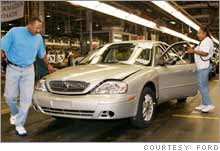GM posts unexpected sales gainGM's strong consumer sales overcome drop in fleet sales; Ford sales plunge 13 percent and DaimlerChrysler sales off 8 percent.NEW YORK (CNNMoney.com) -- General Motors posted an unexpected rise in February U.S. sales, while sales tumbled at Ford and DaimlerChrysler, further eroding those troubled automakers' share of the U.S. market. General Motors (Charts), which just earlier this week had said it expected overall sales to be down 6 to 7 percent for the month, saw sales of cars and light trucks rise 3.7 percent compared to a year earlier.
The rise in sales came despite an 18 percent decline in fleet sales to corporate customers, such as rental car companies. But that was more than balanced out by an 11 percent gain in retail sales. Paul Ballew, GM's executive director of global market and industry analysis, said that the guidance of reduced sales had been a cautious one, and that the strength of the company's retail sales ended up being better than expected. "A lot of the momentum in a couple of [vehicle] categories surprised us," Ballew told analysts. "We didn't mean to send mixed signals. I would characterize it as life happens." Part of GM's gain came in its newly designed pickup trucks, which gained while competing offerings from Ford and DaimlerChrysler's Dodge brand lost sales, as Chevrolet's full-size pickup sales gained 31 percent and the GMC Sierra sales were up nearly 23 percent. Overall GM's sales of light trucks, which includes pickups, SUVs and vans, were up 7.9 percent over a year ago. Not surprisingly, Ballew said GM was pleased to beat even its own sales expectations. "We feel like in a market that is below trend, we are hitting our mark," he said. Jesse Toprak, senior analyst with sales tracker Edmunds.com, said GM was also helped by slightly adding to the sales incentives offered buyers during the second half of the month, a period when Ford and Chrysler were trimming their incentives from higher January levels. "It helped them finish the month on a rally," said Toprak. "Their new pickups have also been very well received." More weakness at Ford, Chrysler But the company's U.S. rivals didn't have as good results. Ford (Charts), which is likely to give up its long-held No. 2 spot in U.S. sales to rival Toyota Motor (Charts) this year, said sales sank 13 percent, due to a discontinuation of two models sold mainly to rental car companies and weak sales of its best-selling pickup. Ford said sales to rental car companies, which are less profitable, fell 30 percent from a year earlier, while retail sales slid 8 percent. About 22,500 of the year-ago sales were in the Taurus sedan and the Freestar minivan - sold mainly to rental car companies and now discontinued. The most recent months saw no Taurus sales and only 502 Freestar sales. But the problems weren't limited to weaker rental car sales. Ford's F-Series pickup, the nation's best selling vehicle, saw sales fall by 7,611 from a year ago, as the popular choice for contractors has been hit by the weak housing market and higher fuel prices. The drop in F-Series sales, coupled with the missing Taurus and Freestar sales, was responsible for about 90 percent of the slide in Ford sales. Ford had warned Monday that sales would be be down 10 to 15 percent in February and its results are actually better than the 23 percent drop that had been forecast by Edmunds. "I think Ford and GM were the two winners of the month, despite the declines at Ford, it was better than expected," said Edmunds' Toprak. DaimlerChrysler (Charts) said U.S. sales slid 8 percent, due to a drop that size at its Chrysler Group unit. It's Mercedes-Benz luxury car unit saw U.S. sales essentially flat in the month. Chrysler Group saw a 7 percent drop in light truck sales and a 13 percent drop in sales of car models. The decline with widespread with every model that was available for sale a year ago except two - the Chrysler Crossfire and the Jeep Wrangler - reporting a drop in sales. "Probably the major concern for Chrysler is they're spending the most on sales incentives and they're not able to catch up on sales," Toprak said. The two leading Japanese automakers in terms of U.S. sales, continued to gain market share. Toyota reported a 12 percent gain, helped by gains in its car models. The light truck models saw only a 2.4 percent gain. Honda Motor posted a 3.2 percent gain. |
Sponsors
|

